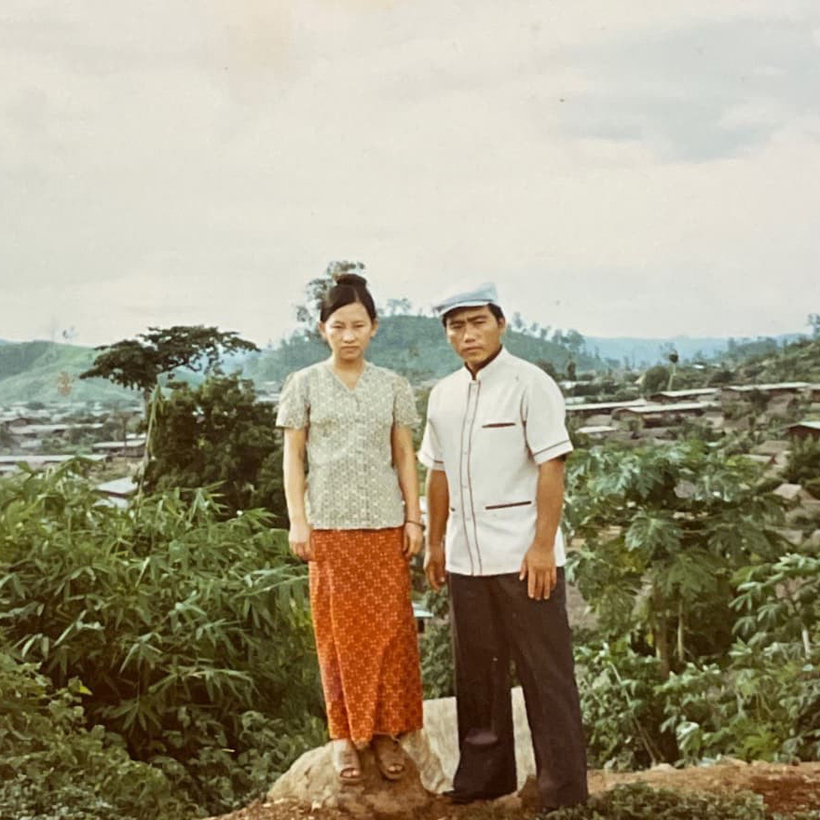Never forget. No one understands this imperative better than the members of a persecuted ethnic minority. Kao Kalia Yang, who was born in a Thai refugee camp to Hmong parents from the mountains of Laos, has made it her mission to inscribe her people’s identity and fate in the consciousness of readers everywhere.
To date, the best known of Yang’s prizewinning books has been The Song Poet: A Memoir of My Father, which in 2022 was included in Esquire’s list of the greatest biographies of all time, and last year was adapted into an opera, with music by Jocelyn Hagen and a libretto by Yang. Now comes Where Rivers Part: A Story of My Mother’s Life, a companion volume on the diaspora of the Hmong in the wake of the Vietnam War.
Throughout that conflict, the Hmong had sided with the U.S. Once the Laotian Communists took over, the Hmong were a marked people. Between family that stayed behind in their mountain forests and family blown to the four winds, keeping track of the players in Yang’s chronicle is not easy. For one thing, their names are, to non-native speakers, indecipherable. A note in the front matter clues us in that Tswb (Yang’s mother’s name) is pronounced “chew,” and that Npis (Yang’s father’s name) is pronounced “bee.” As for Txuj, Hwm, Nplooj, Npib (not to be confused with Npis), and many more, you’re on your own.

But then, the players themselves don’t always know who’s who. Late in the book, after years of misery in a squalid Thai refugee camp and decades of grinding poverty in Minnesota, Tswb returns to her degraded homeland, now under Communist rule, to reconnect with what’s left of her family.
To Tswb’s bitter sorrow, the mother who always saved the tenderest morsels for her is long gone. But the big brother who miraculously found her, lost but serene and unharmed, in the jungle when she was a little girl is still there. So is her beloved, now very frail, older sister, Maiv.
“Tswb, is it really you?,” Maiv asks, clasping the hands of Tswb’s grown daughter Dawb, the oldest of her seven children. “Have you really returned to Laos?”
“Dawb shook her head as tears fell,” Yang writes, in Tswb’s voice. “She pointed to me.”
Off-kilter recognition scenes like this one, in which time collapses, are the glory of Shakespeare’s late romances. Inevitably, they are a long time coming, but their still aura of the miraculous is well worth waiting for.
Kao Kalia Yang, who was born in a Thai refugee camp, has made it her mission to inscribe her people’s identity and fate in the consciousness of readers everywhere.
As is her custom, Yang strikes deep with prose that is spare, concrete, sometimes indeed flat. That’s true even in potentially woo-woo vignettes involving a naked ghost on the prowl by an open grave or the shaman who salvages Tswb’s iffy last pregnancy by means of an inverted bowl of water. Yang evokes the touch of a hand, an angle of the light, the savor of a rare orange or heart of palm with a sensual immediacy uncontaminated by fancy words. Early on, time can stand still for long chapters. Later on, it happens that years melt away in a sentence, or between paragraphs.
Where Rivers Part is the third volume in a perhaps continuing series of prizewinning memoirs by proxy. Yang made her debut in 2008 with The Latehomecomer: A Hmong Family Memoir. The Song Poet, her sophomore effort, appeared in 2016. Formally ingenious, it has an A-side and a B-side, with chapters Yang calls “tracks,” mimicking the old-time cassettes Npis’s songs are preserved on.
In the opera libretto crafted from The Song Poet, Yang spread her wings further, revealing unsuspected gifts for poetic compression and theatrical metaphor. Add to all this a quintet of illustrated children’s books on related themes, including The Rock in My Throat, out this month from Carolrhoda Books.
When Tswb and Npis’s paths first cross in the jungle, she’s a 16-year-old beauty with some education and aspirations; he, a 19-year-old with nothing to his name but the tatters on his back and a lot of family. Yet she follows him without question. As Yang writes in The Latehomecomer, “They did not know each other. They did not know of each other. They each dreamed of a life that could not have included each other.”
In Where Rivers Part, Yang gives us Tswb’s unsentimental, often resentful and disappointed perspective on the way their lives played out. In America, husband and wife sacrifice any dreams of their own, swallow casual insults, and work themselves to a frazzle on different shifts in dead-end, physically punishing jobs to keep a roof over their children’s heads and give them an education.
Considering the odds, the challenge isn’t so much mountainous as Himalayan, and it’s harder on the boys. Yet the daughter who writes the books is not Tswb and Npis’s only success story. What made it all possible, in the face of the couple’s long phases of profound mutual alienation, was the survival of their marriage.
“No one really wants to know about people like you and me,” an unusually mellow Tswb tells Npis near the end of the book, echoing the life experience of survivors of Nazi death camps and displaced populations throughout history. With Where Rivers Part, her daughter proves her wrong.
Matthew Gurewitsch writes about opera and classical music for AIR MAIL. He lives in Hawaii


